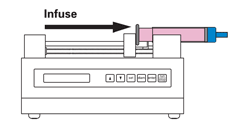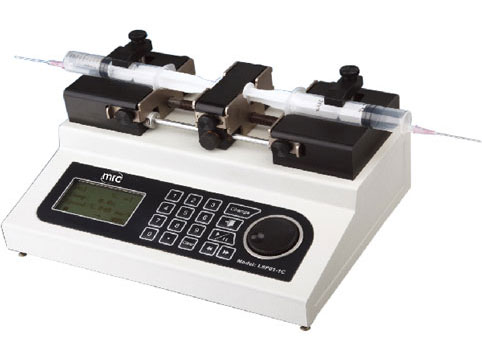A syringe driver or syringe pump is a small infusion pump, used to gradually administer small amounts of fluid for use in chemical and biomedical research.Syringe pumps provide the most accurate delivery of fluids.
Laboratory syringe pumps have become indispensable tools in the realm of scientific research. These precision instruments its important in various industries, offering unparalleled control over the delivery and withdrawal of fluids. From pharmaceutical laboratories to cutting-edge biomedical research, the applications of syringe pumps are diverse and impactful.

Laboratory Syringe pumps are useful in micro fluidic applications, such as micro reactor design and testing, and also in chemistry for slow incorporation of a fixed volume of fluid into a solution.
In enzyme kinetics syringe drivers can be used to observe rapid kinetics as part of a stopped flow apparatus . They are also sometimes used as laboratory media dispensers.

A motor driven (lead screw) slowly turns, moving the plunger of the syringe in, and pushing the fluid out (infuse). Reversing the direction of the motor moves the plunger back allowing you to fill the syringe (withdraw).
What to consider before choosing a Laboratory Syringe Pump
What is the viscosity of the liquid you are pumping?
What are the pressure requirements of your experiment?
Does the pump need to continuously infuse over a 24 hour period of time?
Does the pump need to be programmable?
Does the pump need to be controlled with a computer?
Does the pump need to have TTL capabilities
Advantages of Syringe Pump
• Works at pressures up to 3000 psi
• Highest precision < 0.1%
• Pulse free flow
• Accurately dispense very small to large
volumes < ±0.5%
• Easily sterilizable
• Can dispense or withdraw
• Many easily programmable dispensing profiles:
gradients
• 1 to 10 channels of operation
Applications in Scientific Research
Pharmaceutical Industry
In pharmaceutical research, where precision is paramount, syringe pumps find extensive use. They ensure accurate dispensing of pharmaceutical compounds, contributing to the development of safer and more effective drugs.
Chemical Analysis
They are allowing researchers to precisely mix and deliver reagents. This level of control is particularly valuable in analytical chemistry, where small variations can significantly impact results.
Biomedical Research
In biomedical research, where experiments often involve intricate processes, syringe pumps offer the ability to maintain a steady flow of substances. This is essential in studies related to drug delivery, cell cultures, and tissue engineering..